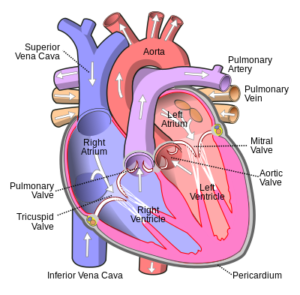Mitral Valve Prolapse
Dr. Claire Arcidiacono, ND
Our next topic is one that will draw heavily upon the anatomy blog that I wrote a while ago. This topic is mitral valve prolapse (MVP). Do you recall how the heart was divided into left and right and then into top and bottom? Well the mitral valve is the valve on the left side. It is the doorway or divider between the left atrium and the left ventricle. As you may recall the mitral valve keeps the blood flowing in the correct direction. In other words it prevents the blood from flowing backward or what is medically referred to as “regurgitating”. Please see the attached picture for a refresher of what the mitral valve looks like. (1)

As we know sometime things can go wrong no matter how well the system is designed. Mitral valve prolapse (MVP) is a problem with the mitral valve. In this heart disorder the mitral valve flaps have become enlarged or stretched out. What this means is that they don’t close properly and therefore don’t form a tight seal and the blood can actually leak backward. One way to imagine this is to think of a doorway. Imagine if the doorframe is too big for the door. In this case there would be no seal between the door and doorway and thus a gap that allows wind to pass through. When this happens with the mitral valve the backflow of blood is called mitral valve regurgitation. (2)
Many people who have MVP have little to no symptoms. For those who do experience symptoms these can include a racing, irregular heartbeat as well as fatigue. You may have difficulty breathing and may even have dizziness. Lastly depending on the severity of the MVP you may experience chest pain that is not caused by heart attack or coronary artery disease. (2)
Now let’s move on to the most common causes of MVP. To start with MVP affects approximately 3% of the population. Women in general are more likely to be diagnosed with MVP than men. MVP does appear to run in families and can be inherited. There are certain chronic conditions that increase the risk of developing MVP. These include Marfan’s syndrome, Muscular dystrophy, Ehlers- Danlos syndrome, Graves’ disease, Ebstein’s anomaly and Scoliosis. (2)
Depending on the severity of MVP there can be complications that occur. Most common is mitral valve regurgitation which as I’ve said is where the blood flows backward. This backward flow of blood makes it harder for the heart to work. If there is severe regurgitation there may be swelling of the upper left atrium and this can lead to arrhythmias or irregular heartbeats. (3)
One important point I want to make about MVP, is that it can get worse as we get older. This makes sense since the heart like all things begins to “wear out” as we age. Certain heart concerns such as prior heart attack or coronary artery disease can hasten this process. This is why it is important to monitor the symptoms you experience due to MVP. As the MVP gets worse over time so will the symptoms. In some cases it will be helpful to take certain medications. In other cases if the MVP is severe enough surgery may be necessary. If the MVP is severe enough to re quire surgery it is very important to follow these recommendations. For those who need surgery but don’t have it the outlook has a tendency to be poor. For those who need surgery but don’t have it there is a 20% chance of dying within the year and a 50% chance of dying within 5 years. (4) I know surgery is always a scary option, but remember that Invite nutritionists are always available to help you with any concerns that you may have.
Now what supplements can help support our Mitral Valve?
- Beets: I recommend beets for MVP because studies have found how amazing beets are for our heart. When we have MVP it is very important to keep our heart healthy. Things such as high blood pressure and heart attack can all make our heart weaker and over time worsen the MVP. Therefore it is important to nip these things in the bud before they get out of hand. Beets has among other things been found in studies to help with heart failure. (5) Please see Invite’s Beets Hx and for more information please see my product highlight on this amazing supplement!
- Coq10: This is another powerful supplement for our heart. Once again it is one of the supplements that is critical to keeping our heart healthy. Studies have shown this to be a very strong heart supplement. (6) Please see Invites CoQ10 60 mg and 120mg as well as our Oral Q10 which is a chewable option!
- B1 is an important B vitamin for our heart health. (7) Please see Invites Nerve Hx, Methyl-B and our B- Complex 100 formulas!
- Creatine is a nutrient that most people don’t associate with the heart. But remember the heart is a muscle and creatine is very important for our muscles. In studies creatine has been found to help our heart health. (8) Please see Invite’s Creatine Monohydrate Powder
- Collagen is another nutrient that most people don’t associate with the heart. But it really is an amazing nutrient for pretty much everything. (9) For more information please see my product spotlight on this topic! Please see Invite’s Collagen Hx, Collagex HA, Collagen 3000 tablets and our Cartilage Hx!
- Our product spotlight will be on Purples Hx
Sources:
- https://en.wikipedia.org/wiki/Mitral_valve
- https://www.pennmedicine.org/for-patients-and-visitors/patient-information/conditions-treated-a-to-z/mitral-valve-prolapse
- https://www.mayoclinic.org/diseases-conditions/mitral-valve-prolapse/symptoms-causes/syc-20355446
- https://my.clevelandclinic.org/health/diseases/17241-mitral-valve-prolapse
- One Week of Daily Dosing with Beetroot Juice Improves Submaximal Endurance and Blood Pressure in Older Patients with Heart Failure and Preserved Ejection Fraction – PMC (nih.gov)
- Coenzyme Q10 in Cardiovascular and Metabolic Diseases: Current State of the Problem – PMC (nih.gov)
- Heart Beat: Heart failure tough on B vitamins – Harvard Health
- Role of Creatine in the Heart: Health and Disease – PMC (nih.gov)
- Extracellular Matrix in Heart Disease: Focus on Circulating Collagen Type I and III Derived Peptides as Biomarkers of Myocardial Fibrosis and Their Potential in the Prognosis of Heart Failure: A Concise Review – PMC (nih.gov)








